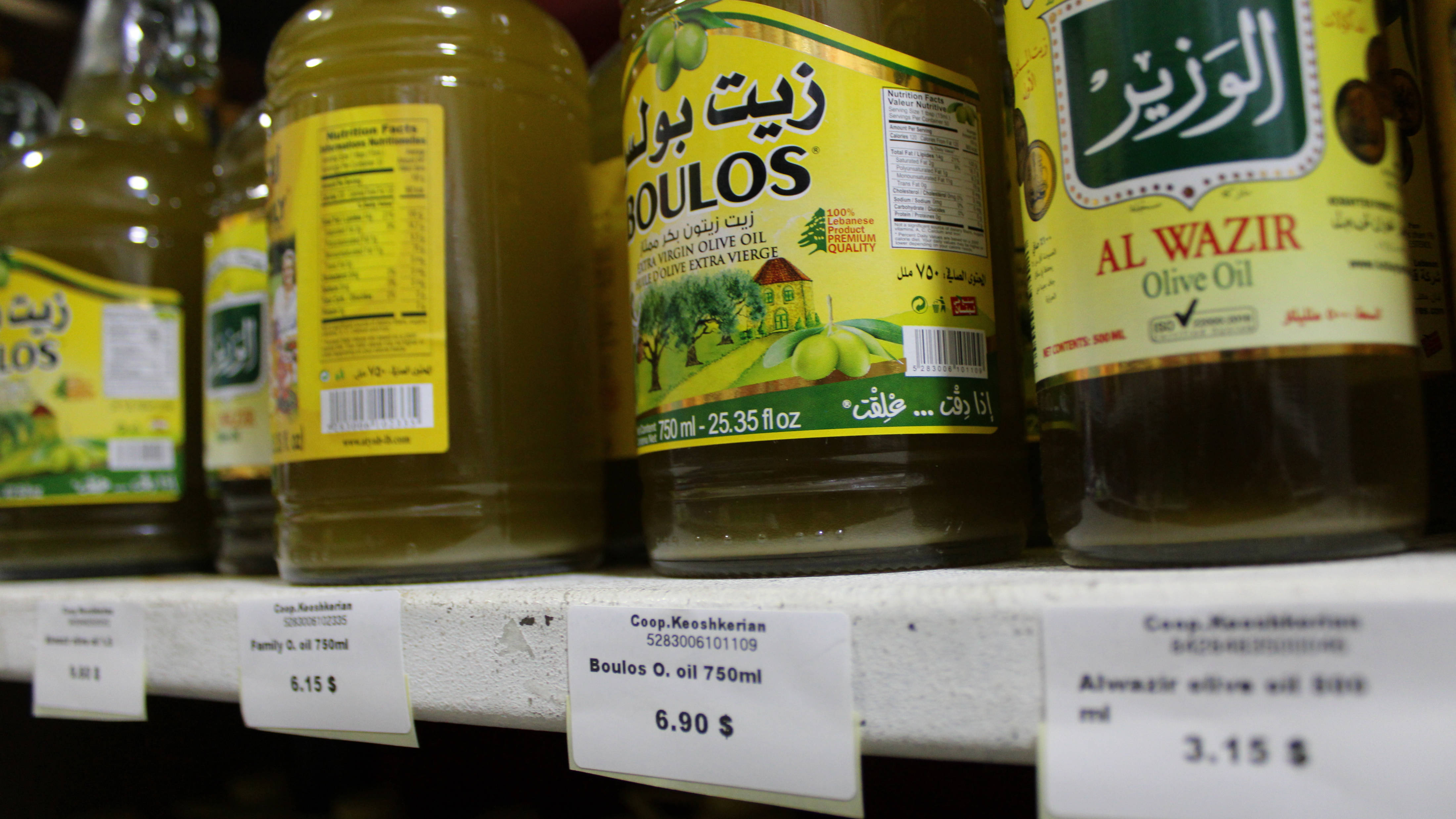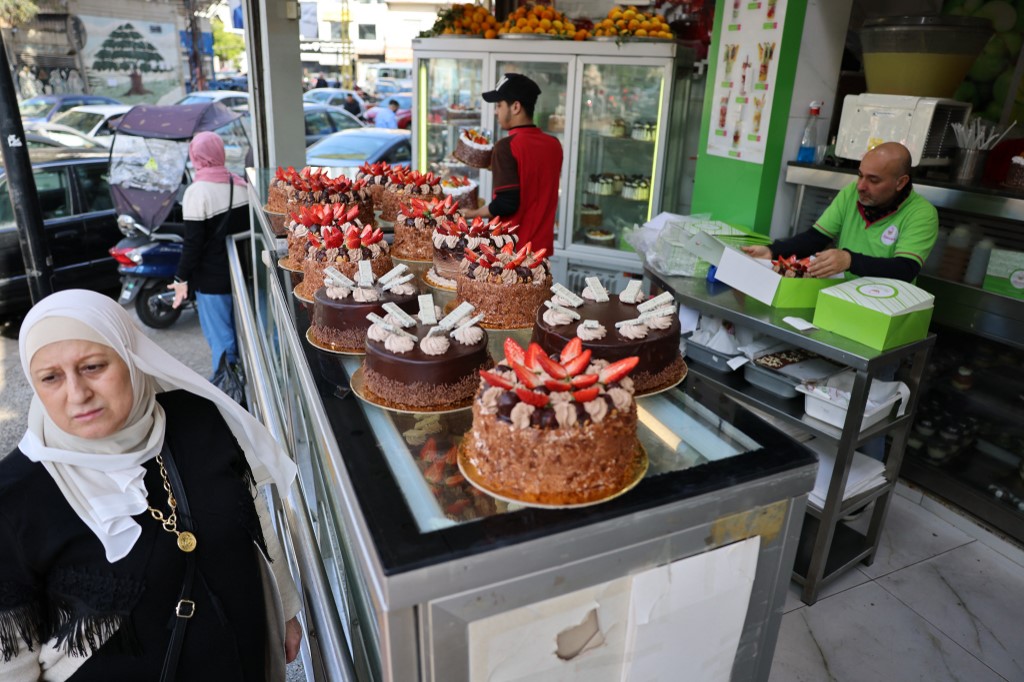How Lebanon is replacing the collapsing lira with the dollar

A bustling row of shops in Beirut’s Armenian neighbourhood, Bourj Hammoud, is now covered in dollar signs.
The scene in Bourj Hammoud is echoed across Lebanon - as the country’s lira plummets to record lows, shop owners are increasingly opting to display prices in the more stable US currency.
A short walk down the dollar-plastered windows is a small supermarket, where 42-year-old Razmig Keoshkerian frantically changes the price labels.
'You go to sleep and you know how much you will lose because you didn’t change the price'
- Razmig Keoshkerian, retailer
For the past 20 years Keoshkerian has run the supermarket with his brother, but nothing, he says, has compared to the stress they have faced in the last three years amid the country’s economic crisis.
The Lebanese lira has been in freefall; the country’s largest 100,000 lira bill is now worth less than $1, a staggering decline from $66 before the financial crisis hit in 2019. The Lebanese currency was rated the worst performing in the world this year, according to data compiled by Bloomberg.
Stay informed with MEE's newsletters
Sign up to get the latest alerts, insights and analysis, starting with Turkey Unpacked
"The lira has lost its role as a currency," Layal Mansour, an economist specialising in dollarised countries, tells Middle East Eye. "We can never expect Lebanon to restore its currency trust, economically speaking, theoretically speaking, or practically speaking," she says.
Due to the lira’s dramatic fluctuations, each day Keoshkerian does not adjust the prices he loses money.
"Every day is a marathon," he tells MEE, "You go to sleep and you know how much you will lose because you didn’t change the price…It must be changed, but sometimes I don’t have enough time."
Since the government’s decision this month to allow supermarkets to price in dollars, Keoshkerian has been trying to switch to using the US currency. With dollars, the prices will not fluctuate as drastically, and Keoshkerian can more easily account for his earnings and losses, he says: "If you have dollars, there is not as much of a problem."
Leila Dagher, an economics professor at the American University of Beirut (AUB), tells MEE that the decision to allow pricing in dollars "should have been made long ago because it primarily protects consumers".
With dollars, the price fluctuations are minimised and consumers can more easily compare prices without the constant changes, thus increasing competitiveness between shops, she says.
Now, about half of Keoshkerian’s goods are priced in dollars, and he hopes more will be soon. "Of course, I will sleep better if the items are in dollars," he says.
Vulnerable bear brunt
Unsustainable borrowing, financial mismanagement and corruption by the sectarian ruling elite, coupled with years-long periods of political vacuums and virtually no productive economic growth, have fuelled one of the world’s worst economic crises since the mid-1800s, according to the World Bank.
Since 2019, Lebanese banks have imposed tight restrictions on withdrawals, leading angry depositors to resort to lawsuits or armed raids on banks to access their funds. This week hundreds of protesters, many retired soldiers, gathered in front of the country’s parliament and clashed with police, frustrated by their mounting economic woes.
'The lira has lost its role as a currency'
- Layal Mansour, economist
Meanwhile, the government has continued to implement policies that have only exacerbated the already dire situation.
"The increasing inflation rate leading to quicker currency depreciation - and of course loss in purchasing power - is a result of the government’s 2022 budget policies," Dagher says.
Lebanon’s central bank on Tuesday announced it would begin selling "unlimited" amounts of US dollars at a discounted rate, in an attempt to stymie the spiralling currency. But Dagher said the amount is not unlimited and while the decision may briefly slow the lira’s depreciation, the currency will hit record lows again "very soon".
At the start of this month, Lebanon without warning tripled its customs tax in the hope of filling some of its empty state coffers, only the second tax rise in decades.
In a country that imports over 90 percent of its goods, the decision will only lead to higher prices and a loss of purchasing power, hurting mostly poor and vulnerable households, Dagher says.
At Keoshkerian’s supermarket, Denise, a 42-year-old mother of four, strolls the shampoo aisle, inspecting the freshly labelled dollar tags. "The prices have gone up so much," she tells MEE, "It’s really hard."
Denise says the last three years of crisis have put her family in a tight financial situation. She doesn’t work and her husband works a shift job where he gets paid in lira.
Even though her children sometimes pick up small jobs to help out, the money is only enough for food and rent, she says.
Today the salaries of many in Lebanon are worth only a fraction of their pre-crisis income, failing to keep pace with the rampant inflation.
A 2021 AUB study of 931 households across seven different sectors in the country found that each family only had access to an average of three to five million liras per month, worth just $30 to $50 at the time.
Denise has diabetes and, with a meagre income, struggles to afford the now exorbitant medication costs, with the state having done away with subsidies on most medications.
Denise points to the diabetes-induced rash that has broken out on her fingers and toes. "It’s not good if I don’t take the medication. It will really hurt me," she worries.
Give up the lira?
Lebanon is faced with a growing debate over whether the country should do away with the lira.
Since the 1980s, 60 to 70 percent of the country’s loans and deposits have been in dollars, classifying it as "highly dollarised", which Mansour says is "one of the worst economic indicators".
'A currency crisis in a dollarised country has no end'
- Layal Mansour, economist
"If the country is only a little bit dollarised, you can treat it," says Mansour. But in Lebanon’s highly dollarised economy, she adds, "you cannot go backward and correct your currency, so, it's better to totally give up your local currency".
In a transition to full dollarisation, Lebanon could officially decide to abandon the lira and adopt the US dollar at a fixed exchange rate, as a means of payment and a unit of account.
Another path to remove the lira could be what economists coin a "currency board", when an authority is created to regulate a new national currency, created and pegged at a fixed exchange rate, and 100 percent covered by US dollars.
However, Joseph Bitar, a professor of economics at the IESEG School of Management in France and an expert in Lebanon’s monetary policy, says that the market is deciding which currency it wants to use.
"Let’s not intervene in market forces," he tells MEE.
Bitar argues that the market will weed out unproductive sectors, including much of the public sector, which will continue to be paid in lira, and favour the productive sectors, paid in dollars. Without major political reform "the public sphere will always be a hurdle to the advancement of this country," he says.
But Mansour, a proponent of full dollarisation, says that without institutional action the quality of services in Lebanon will continue to decline.
"A currency crisis in a dollarised country has no end," she says.
Wealth inequality on rise
Some economists have said that the dollarisation trend will create two classes - those who have access to dollars and those who don't - widening the already vast income inequalities in the country.
However Dagher says that just pricing goods in dollars will not affect wealth inequality; but what will is the ability to access dollars as a source of income or not.
The 2021 AUB study found that only 13 percent of families had access to dollars, with the vast majority left without the greenbacks.
Denise, the shopper whose husband earns in lira, says she cannot afford to send her youngest child, who is eight years old, to a private school. Lebanon’s public schools have been closed since December, with teachers on strike over their lira-paid salaries now too low to live on.
But down the aisle from Denise, another shopper, Zeina, says that while the economic crisis has been difficult, she has been able to manage.
Her husband works in a private company and is paid a fourth of his salary in dollars, an increasing normalcy in Lebanon as the local currency spirals.
Zeina and her husband are able to afford the $300 monthly fees for each of their two children’s education at a private school - what Denise could not afford. Her youngest child instead has been out of school for months.
Meanwhile, Denise’s 18-year-old daughter hopes to go to university, but the fees are another cost she and her husband will not be able to afford. Their daughter will have to try and find work instead, she says.
"But haram," she adds, "She’s very smart."
This article is available in French on Middle East Eye French edition.
Middle East Eye delivers independent and unrivalled coverage and analysis of the Middle East, North Africa and beyond. To learn more about republishing this content and the associated fees, please fill out this form. More about MEE can be found here.







